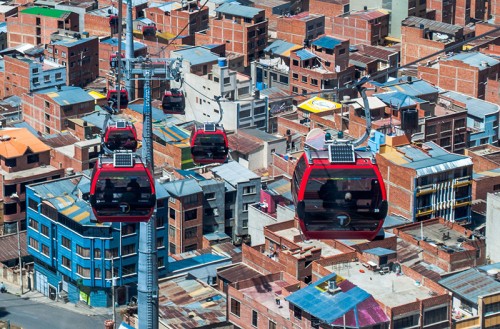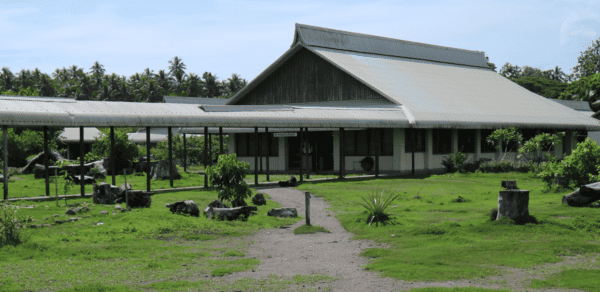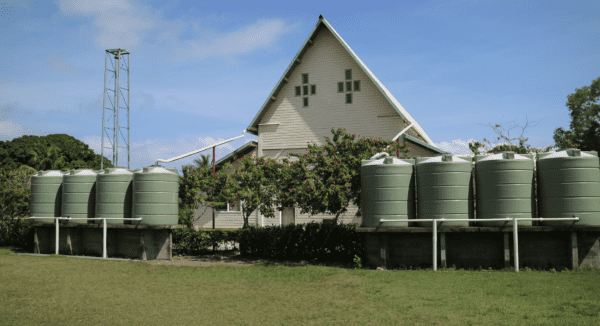Image: Views from the new cable car and its station in El Alto, La Paz, Bolivia (David Almeida, Flickr).
Unsurprisingly, when people are asked about corruption, they say they are against it. But that doesn’t tell us what they really think about it, or what they do when confronted with it.
While minds can’t be read, there are certain social and political indicators that suggest a significant level of tolerance towards corruption. The re-election of governments that are known to be corrupt, for instance. The continued paying of bribes, despite the widely accepted credo that the person who pays up is as corrupt as the person who demands cash. In some countries bribery is so widespread, it has come to be seen as a natural and normal practice. Bolivian life offers a good example of this everyday reality.
Bolivians do not generally think that their president, Evo Morales, is corrupt. Yet, according to the Latin American Public Opinion Project, they do say that there is now more corruption than before and also that the government is to blame for it. Despite this, and criticisms that the government has broken its promises, annexed state power, lacks transparency, and fails to respect laws, Morales and the Movement towards Socialism (MAS) was re-elected in October 2014 for a third term. Although the integrity of the elections has been questioned, MAS was well ahead of its nearest rival, the National Front (UN), taking 62% of the vote against UN’s 24%.
But, beyond the result, what really suggests a certain tolerance towards corruption is the argument often used to justify it. During anti-corruption fieldwork in Bolivia, we’ve heard people say: “Yes, we know the government steals. But they also do things like build roads, provide a funicular in La Paz, and other good things.”
So, what do Bolivians really value about their society? And why, despite highly publicised government efforts to fight corruption, do people think that now there is more corruption than before?
Intriguingly the Latin American Public Opinion Project reveals a mismatch between people’s direct experience of bribery and their perceptions of corruption. So while reported experience declined from 51% in 2000 to 33% in 2010, perceptions that corruption is a problem went up from 63% in 1998 to 74% in 2010. It seems popular perceptions of corruption may be based not on fact, but on a set of beliefs and values that shape social attitudes towards corruption.
Money and material goods are highly valued in Bolivia, as reflected in the local witticism: ‘he who steals 10 bolivianos [about £1] is a thief; he who steals millions is a millionaire’. The fieldwork we conducted in late 2014 as part of the EU’s ANTICORRP project revealed a clear sense of satisfaction among Bolivians about the perceived prosperity of their country today.
This perception comes from policies such as the nationalisation of the hydrocarbon industry, and a general policy of ‘giving away money’ – paying double wages at Christmas and bonuses to pregnant women, children, and the elderly. Experts predict future economic problems, since such populist measures can hardly guarantee long-term economic growth. Nevertheless, the ‘policy of giving’ plays very well with the majority, for whom “all that matters is to have money today”. One interviewee told us that government stealing is forgiven in Bolivia, so long as the people get something in return.
Another popular Bolivian saying has it that society is divided between clever people who know how to take advantage of any situation and idiots who do not. This implies an acceptance of a ‘natural’ link between power and the opportunity to become wealthy. Evo Morales’ discourse turns on the principle that now it is the turn of the indigenous peoples and the marginalised to govern; one interviewee suggested that this translates as ‘it is now our turn to enjoy the benefits of power, as others did before’.
There is a widespread belief that even public officials who have the best of intentions will find the context in which they work more powerful than any personal commitment to integrity. Guillermo Pou, founder of Transparencia Bolivia, says Bolivians feel that belonging to a group is more important than thinking for themselves. This makes it hard for anyone to stand up for what they believe in if their personal values conflict with the views of those around them. This situation is similar to that facing citizens in the former Soviet Union as described by Grodeland, Koshechkina and Miller in the late 1990s: ‘Foolish to give, and yet more foolish not to take’.
This all suggests that values and beliefs, seen in context, may hold the key not only to our understanding of attitudes towards corruption, but also to what we can do about it.
Transparency, accountability and more efficient bureaucracies are obviously part of the solution. However, Bolivia shows us that reducing tolerance of corruption is also a critical factor that goes to the very heart of the problem. Anti-corruption policies are usually wholly focused on regulating behaviour by punishing infractions of ethical codes. Clearly they also need to proactively develop integrity programmes that can promote and embed best practice.
The challenge of actively promoting integrity – not just fighting corruption – will determine whether there can be real change in both attitudes and outcomes in Bolivia.











